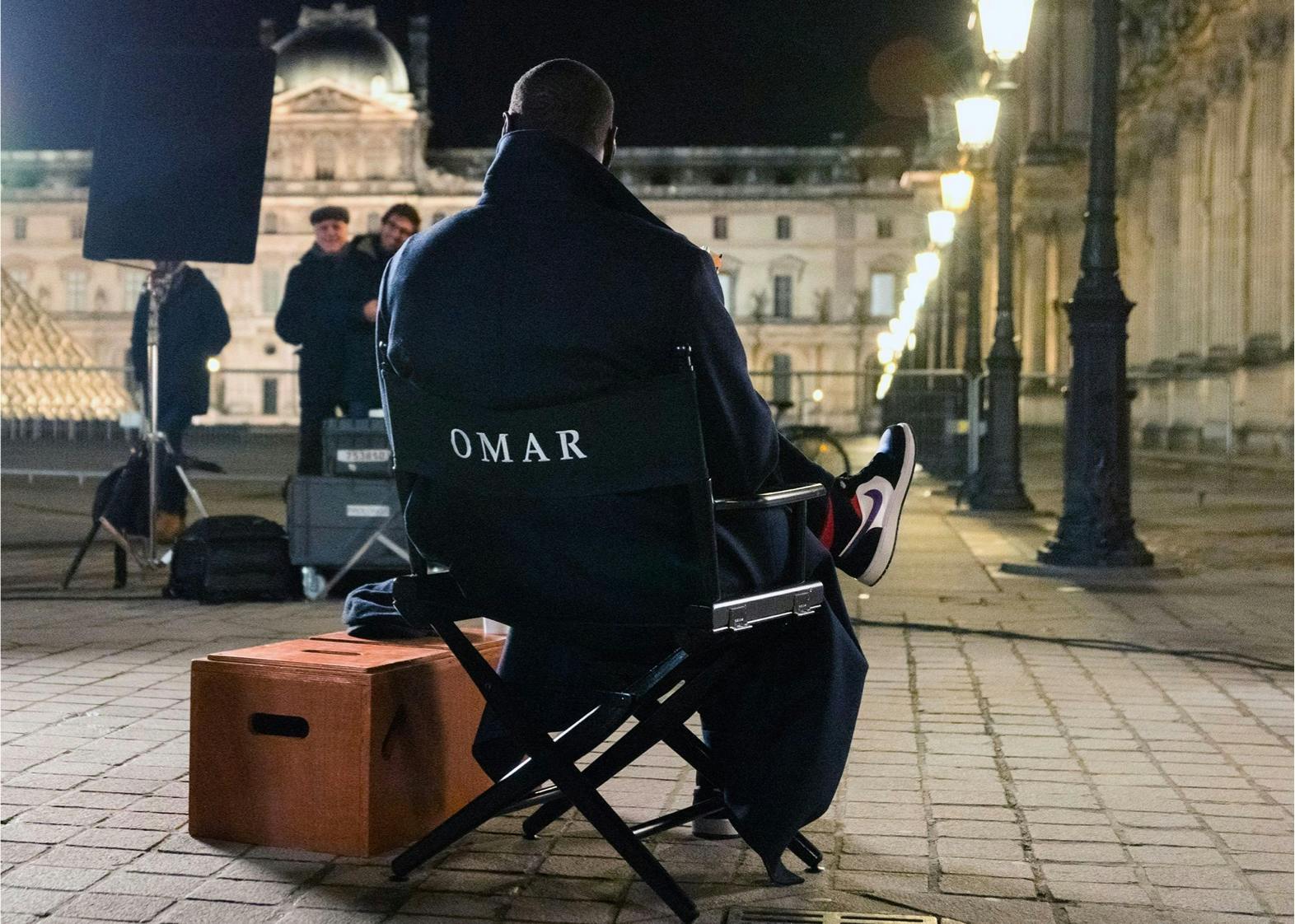The Lupin actor discusses his colossal career.
The first time Omar Sy found himself at the center of an all-consuming cultural sensation, it was 2011, and he was starring in the film The Intouchables. The feel-good drama, in which Sy plays a caregiver to a quadriplegic aristocrat, became one of the biggest global hits in the history of French cinema and shot Sy to a stratospheric level of fame in his home country. And for his phenomenal performance in The Intouchables, he also became the first Black winner of the Best Actor César (France’s Oscar).
Now Sy’s back in the spotlight once more thanks to his winning turn as the wildly charismatic Assane Diop in the thrilling crime drama Lupin. The critically acclaimed series has captivated audiences worldwide, with more than 76 million households watching in its first 28 days, becoming the first French-language program to break into the U.S. Top 10 list. “You never really expect something like that,” Sy says. “But we knew that we were doing something special because it was one of the first times Netflix put that amount of money into French content, so it was already historic for us. We really focused on doing the best we could because we knew that it was going to be watched and that people were going to watch it as ‘French content.’ For us, it was like carrying the French flag — we wanted to honor that.”
The series takes its name from one of the most popular and enduring characters in the French literary canon, Arsène Lupin, a gentleman thief with a top hat and a monocle whose adventures have been eagerly devoured by readers since his introduction in 1905. He’s France’s version to James Bond or Sherlock Holmes, and in the world of the Netflix series, no one knows his playbook better than our hero, the Lupin-obsessed Diop — an uncatchable criminal who could easily out-smooth the Ocean’s Eleven crew.
When Lupin opens, Diop is scheming to purloin Marie Antoinette’s necklace from the Louvre, but it’s not greed that drives him, it’s revenge: Diop is on a personal quest to avenge injustices against his late father, Babakar (Fargass Assandé), a Senegalese immigrant who once worked as a driver for the Pellegrini family: one of the wealthiest and most influential families of France and the owners of the necklace in question. The second season ratchets up the tension even further; when Diop’s own son is kidnapped, he must do everything in his power to retrieve the child before it’s too late. Throughout Lupin, Sy offers the magnetic, mesmerizing performance we’ve come to expect from this César-winner.
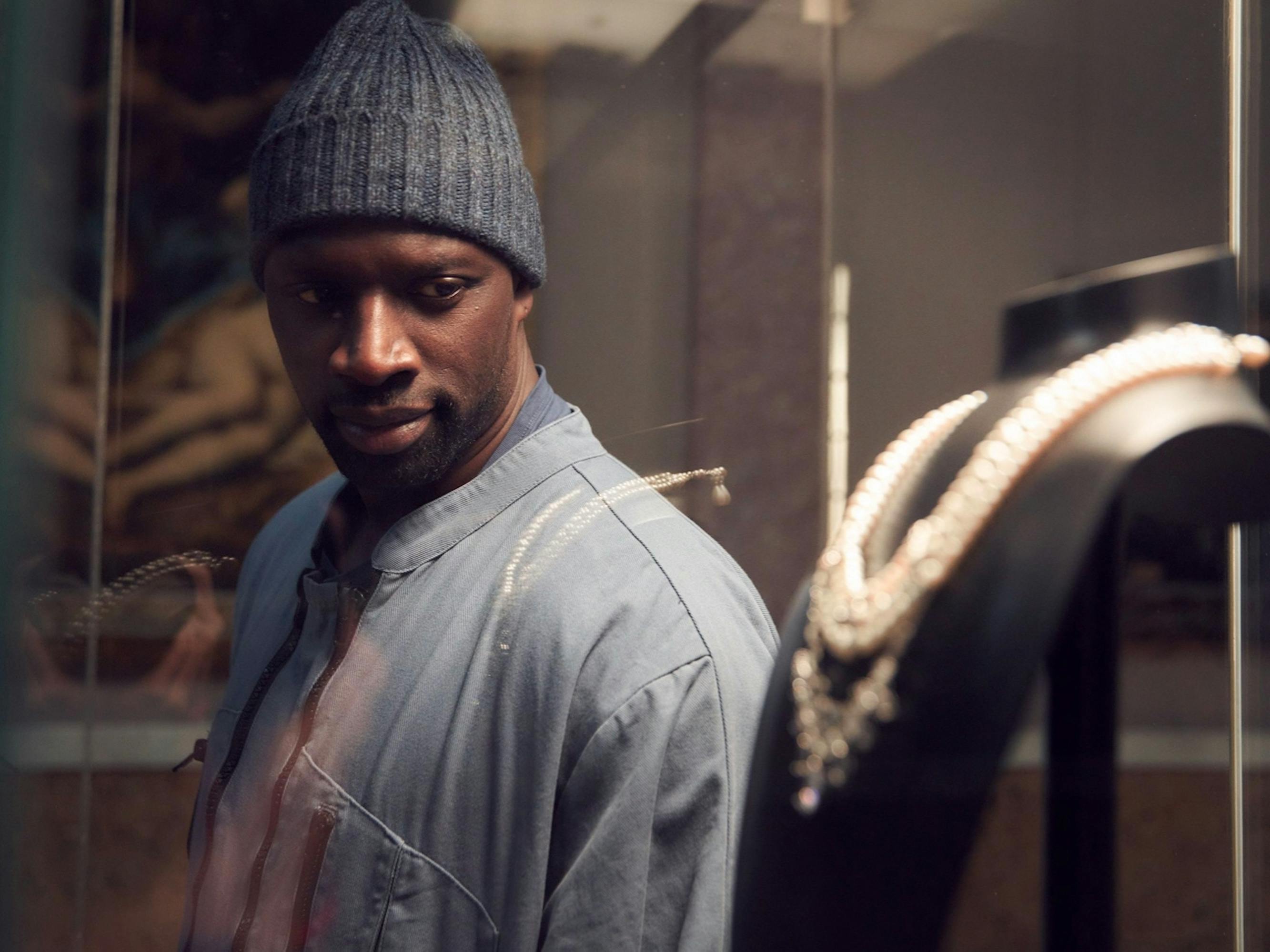
The in-demand actor recently spoke with Queue’s Krista Smith about keeping considerably cool in the face of this new round of mega-stardom, what initially drew him to acting, and how he came to learn English from an unexpected source: the Kardashian family.
Krista Smith: The character of Arsène Lupin is hugely famous in France. There have been so many iterations of this character, but your show put this incredibly creative spin on the legend.
Omar Sy: That was the reason we wanted to do the series because, like you said, in France, Lupin is really part of our culture. There have been so many Lupins onscreen — for TV, for theaters, a lot of Lupin everywhere. So, for us, the question was, Okay, why do one more? How can our Lupin make a difference? That’s why we decided to have a character who was inspired by Lupin, the fiction, the book. In our show, the book is a real character. It was interesting to develop a character that has been inspired by Lupin because you can use everything that Lupin can give you — the charisma, the way he’s so smart and charming, everything. At the same time, you can develop another side to him and make Lupin relevant to today. Lupin was created at the beginning of the previous century, right? So, we could develop a character, a version of Lupin, from today and have him and Lupin essentially exist as one and the same. It was the best way to do that.
There’s a sense of escapism at play with these inconceivable heists that happen, but at the same time, Assane is very human. He’s dealing with a lot of human issues. Coming from a working class environment, dealing with his relationship with his ex-partner, the mother of his son. How was all of that for you, as an actor, to explore?
OS: I used to say that Lupin is really the best toy you can have as an actor because you can go through everything with him — the action, the drama, and all the problems that human beings deal with. He’s like a superhero, but at the same time, he’s just a normal guy who’s trying to manage the professional and personal side of his life, always trying to find that balance. As an actor, this is the best. You can’t have it better. There is no way to have a better character than him. He’s just the dream role.
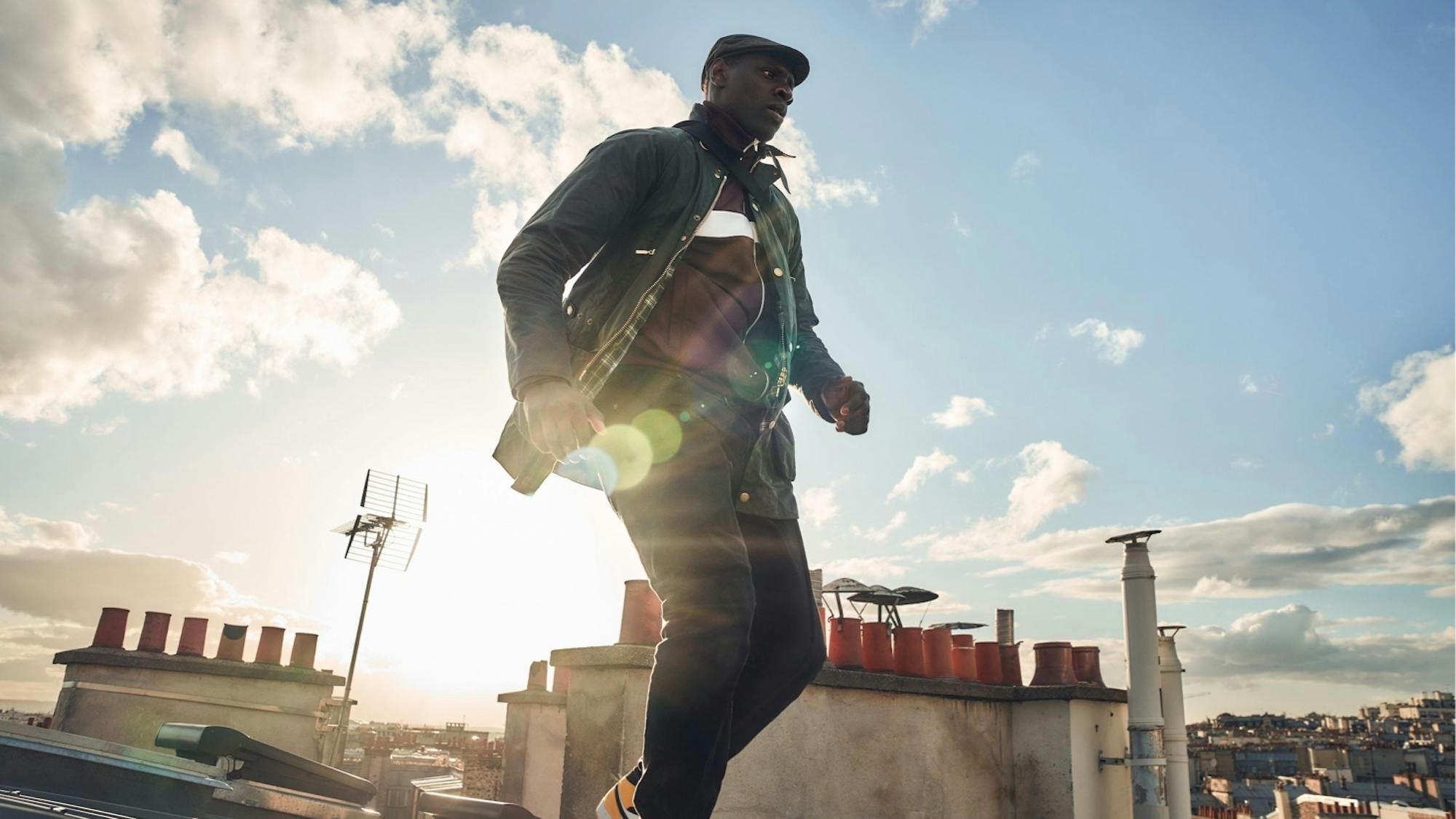
You started in comedy. No one in your family was an actor, no friends were actors. There was no ambition of going to one of the fancy prestigious drama schools. So, how did this profession come to you?
OS: When I was still in high school, I had a friend who’s a very famous comedian in France now. When he started, he had a radio show and he was struggling to find guests. So, I came and helped. I was pretending to be a famous soccer player. So I started like that, pretending to be someone else. It was something I was doing for fun and for my friend. When he went on TV, he brought me with him, and I started to do small sketches with him. I was doing that comedy stuff. Then I started acting in movies, small parts, and just little by little, I became an actor. I discovered it while I was doing it, actually.
You grew up in a working class suburb of Paris. I want to know what was in the water because although it was tough at times — you’ve talked about the fact that it was a rough neighborhood — that suburb produced one of the biggest soccer players, Arsenal striker Nicolas Anelka, who also went to your high school, and Omar Sy. What happened in those buildings west of Paris?
OS: I don’t know. Maybe it was the geographic situation because we were close to Paris, but at same time, we’re not that close. We are right in the middle of something. It’s not really the countryside, but it’s not really the city. So, because it was that in-between situation, we were insulated. To get out of a space like that, you need to be really creative. We had to create a lot of things; every day was about creating something, dreaming, being together. We had to do something special because the situation was special.
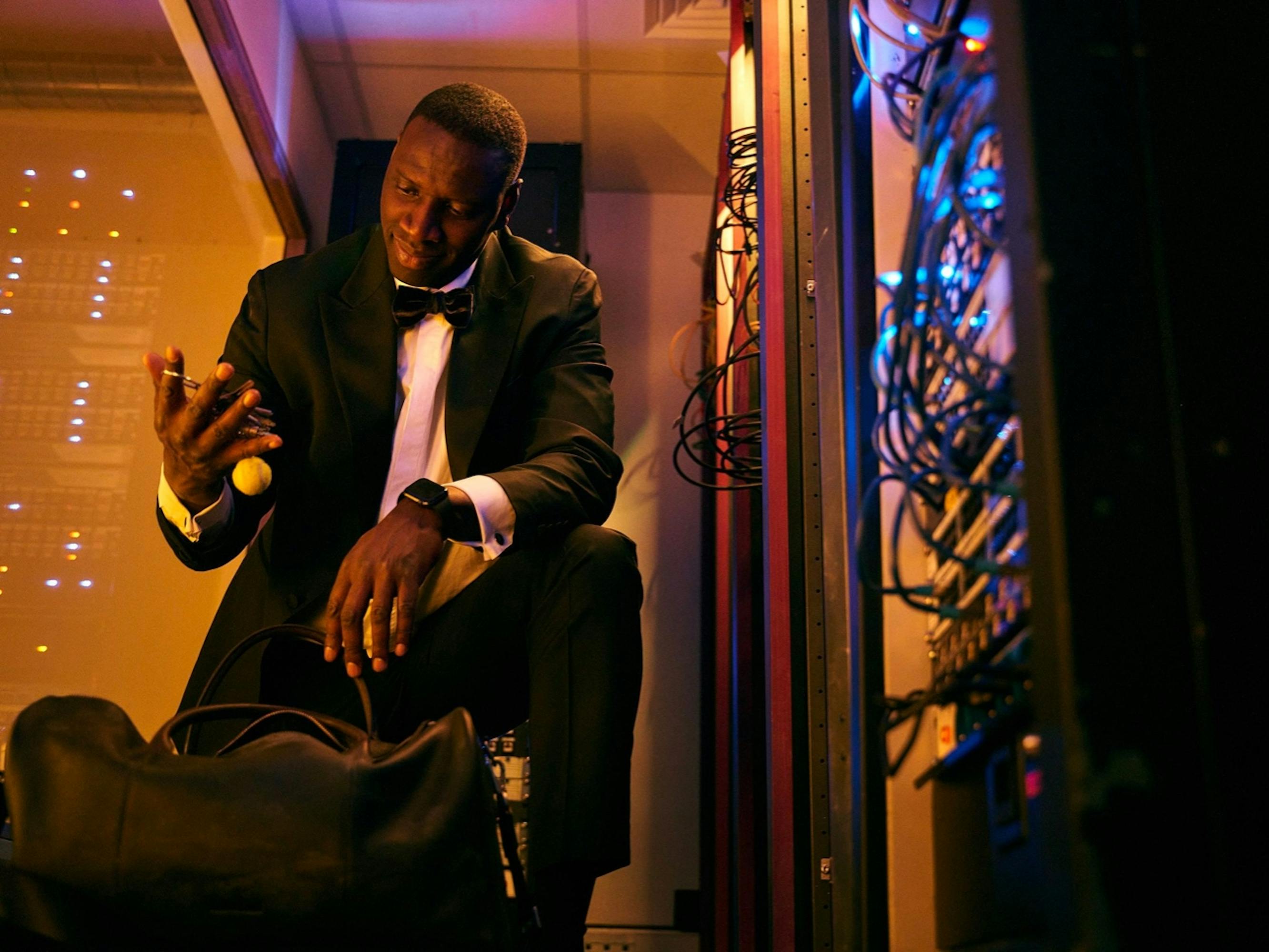
Lupin has a tremendous amount of comedy in it, which works because your timing is so spot on. You’re one of eight kids — did you use humor to your advantage? To get attention? To diffuse tension? Can you tell me how you developed that?
OS: Yeah, of course. There were eight siblings, and I’m the fourth, so right in the middle. It’s like my situation between Paris and the countryside, right in the middle. I’m not the oldest, I’m not the youngest, so, you have to define yourself. Humor was the best way, and it was also a good way to connect with people outside because in our neighborhood there were a lot of people. You have to be able to find your own space. Humor is something that we use a lot to communicate and to deliver our messages. It’s something that came through naturally because it was a part of our environment.
Tell me how your life changed once The Intouchables was released. It has become the second highest grossing film in France. You’re one of the most recognizable, most beloved individuals in the country. Do people still stop you when you are in France? Do people stop you in Los Angeles about that movie?
OS: It was really the beginning of something incredible. I had my fame in France. I was working. I was really happy, you know? When the movie came out, that was something else because outside of the country I was starting to be recognized — and it was my first lead role. Éric Toledano and Olivier Nakache, the two directors of The Intouchables, I met them in 2001 for their third short film — they wanted me to act in it, but at the time, I wasn’t an actor. I was just a comedian on TV. They said, “It’s okay, let’s try it together.” So, we started our journey like that. One day they said, “Okay, we’re gonna write a movie for you so that you will understand that you’re an actor.” The movie they wrote was The Intouchables. I got the César for it. So, they really did it! After that it was undeniable: Okay, I’m an actor. I can do that now. It was an amazing year, traveling with that movie, seeing the movie in other languages, seeing crowds from other countries laughing at the same jokes or being touched by the same scenes. That changed me for the rest of my life.
I don’t have any pressure because that person is not me. I look like him, but I’m not him. What he’s carrying, I cannot carry that. It’s too heavy; I’m just a human being.
Omar Sy
And then you decide to move to Los Angeles where nobody knows you. You come to Hollywood, you don’t really speak English. I love the balls of that. What was it like for you when you first got here?
OS: I wanted to move because I was overwhelmed. I understood something huge was happening. I understood that now I could be an actor, and I had to make that choice: I’ll have to either pursue my career as a comedian or maybe try to be an actor. I needed time to think about all of it. I also saw that my kids’ lives were changing because I was taking a lot of space from them at school. I was their dad before The Intouchables and after The Intouchables but my celebrity was affecting how they were treated. So, we decided to leave and go to Los Angeles for a year and take time to breathe. Here, the kids were adjusting very, very well. We were happy, and I felt less pressure on me. So we decided to stay, and I started to work here. But I had to create something because nobody knows me. Here I cannot even communicate with people. So, it was more of my type of environment. In France, everything was “yes!” I don’t know how to live in a “yes” world. I was built with so many “noes.” A “yes” felt like, Oh, how am I going to deal with that? That’s why I needed to try to build something else. And also, because of everything that had happened with The Intouchables, I knew I could go back and work in France. It always was something I could do.
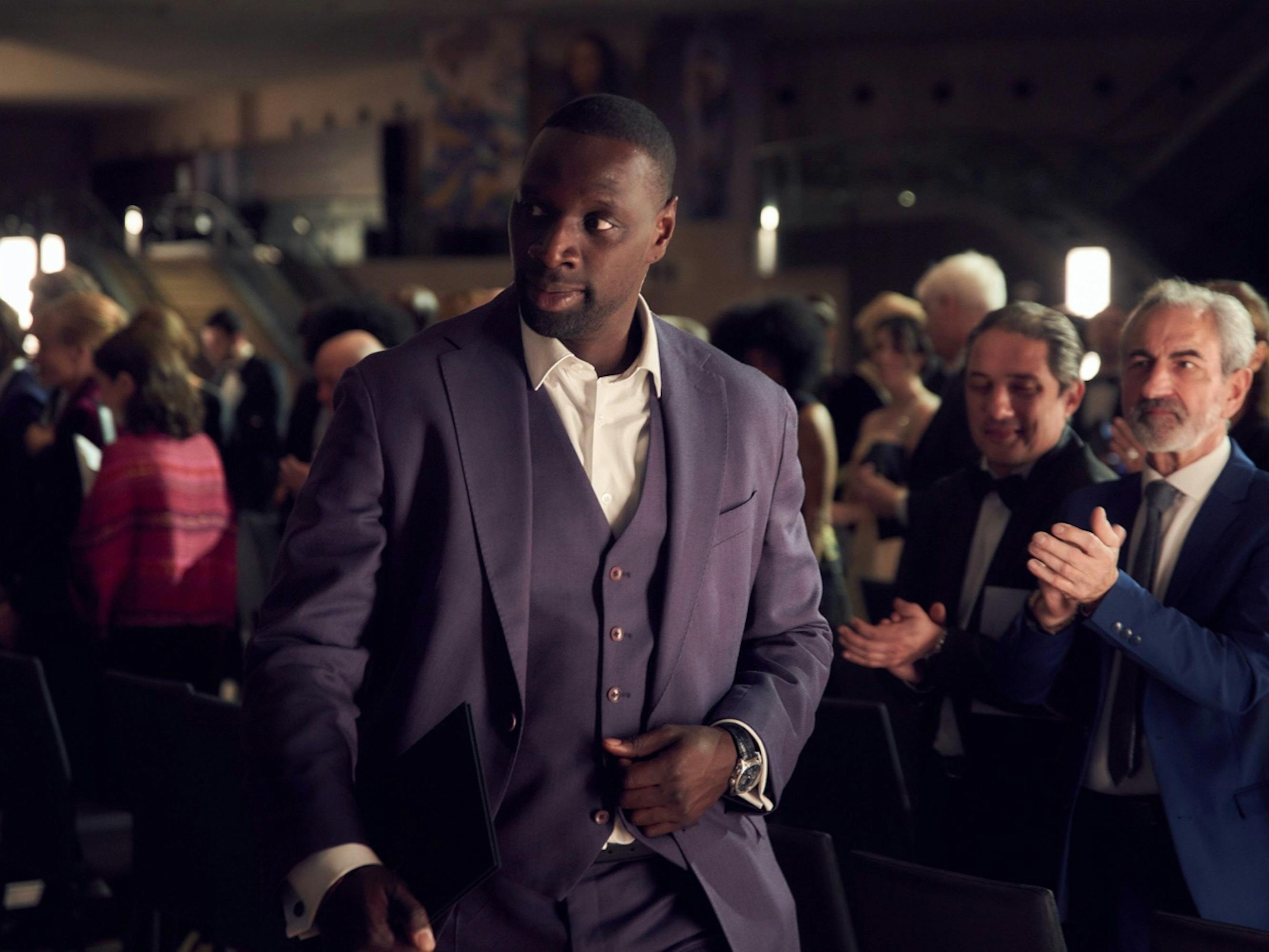
The struggle is where you thrive. I know you’ve talked about this before, but is this really true — you learned English by watching Keeping Up With the Kardashians?
OS: It was accessible with my level of English. It was something that I could pick up and understand and follow. I remember turning on the TV and trying to watch the news. Watching CNN, they were talking so fast. I was like, Okay. I’m going to be fluent the day I understand that guy. I tried changing channels, and I found The Kardashians. That, I could understand. So I started to follow that, pick up some words and sentences. “Oh my God” was something I learned very, very quickly. And different types of “Oh my God” — there were different rhythms for it depending on what was going on. The musicality of it was very interesting. That’s how you learn.
So now can you watch CNN and understand it?
OS: Yes, I can.
Earlier in the conversation you said when you started making Lupin, you felt like you were carrying the French flag. Obviously in America, we don’t consume an enormous amount of French content. To have everybody watching this very intrinsically French character, do you feel any pressure? Now that you’re more mature when you go back to France and you’re Omar Sy, this larger than life character, how is that for you?
OS: I’m the same guy that came to the radio station that day because it was fun. I always try to find the fun in everything I do. That’s my motivation. I’ve always tried to remember why I’m here. I’m here because I wanted to have fun. I try to keep that. People see me as that guy Omar Sy you describe. It’s not me. The day I believe I’m that guy, I’m done. Because I know I’m not. That’s why it’s important to have your family, your friends, and your parents because they see you in the right way. In their eyes, you see who you really are. So for me, I don’t have any pressure because that person is not me. I don’t know this guy. I look like him, but I’m not him. What he’s carrying, I cannot carry that. It’s too heavy; I’m just a human being. In French, there is a saying that there is no crazier person than the king who thinks he’s a king. Even the king is not really the king. It’s a concept. It’s something in people’s minds, but the king himself is not that concept. It’s just a projection, you know? As soon as you know that, you can sleep very calmly.
